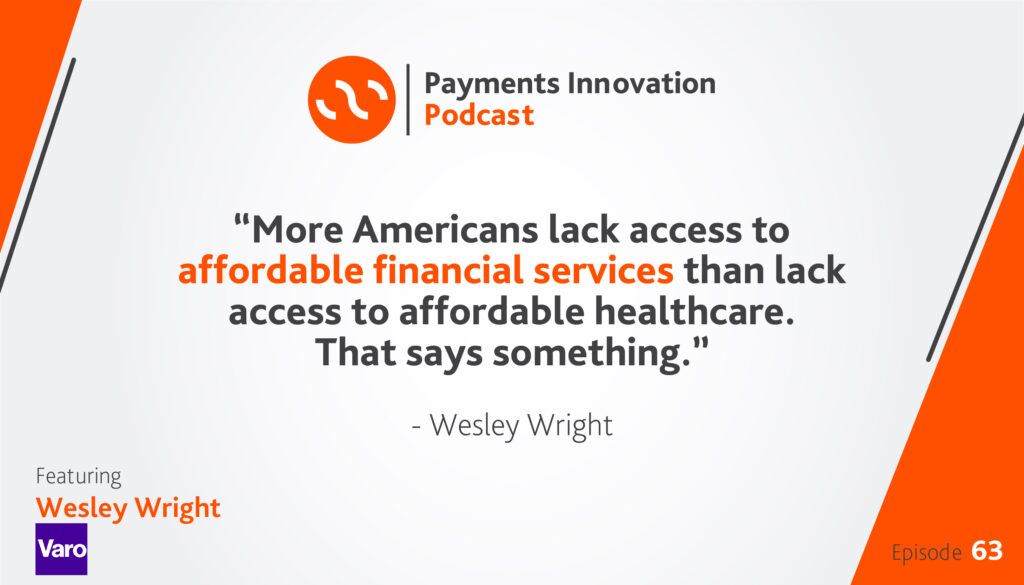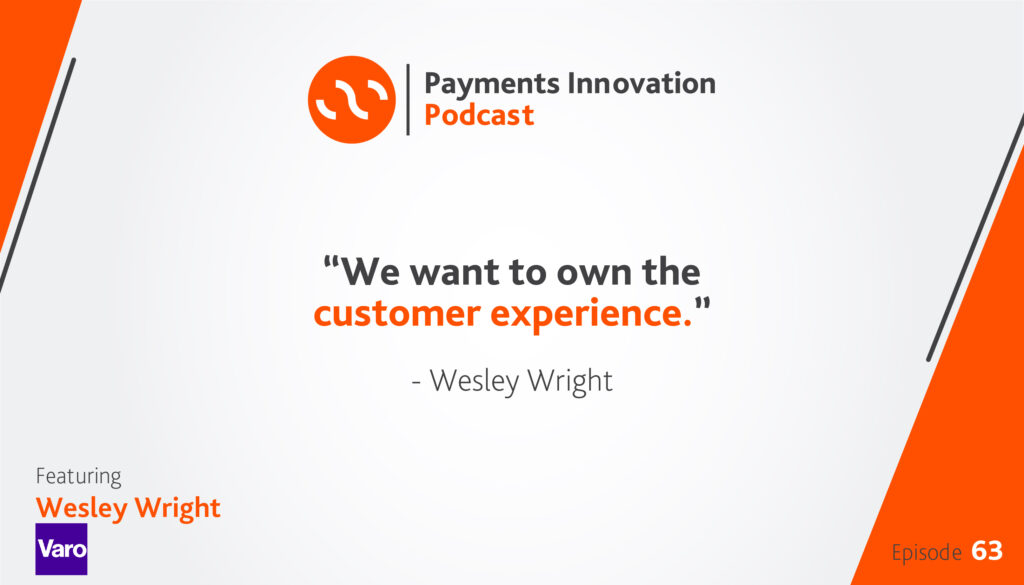Across the United States, challenger banks are springing up, such as Chime and Simple. But, within the US, most of these don’t actually have their own charter.
Meet Varo Money — the digital bank that wants to become the first challenger bank to receive its own US charter.
I spoke with Wesley Wright, Varo’s COO, on the Payments Innovation podcast to hear about why pursuing their own charter is so important. Wesley’s response?
Because they want to own the entire customer experience.
What we talked about:
- Traditional banks haven’t responded to everyone’s needs
- Varo focuses on long-term, core banking relationship with customers
- Varo’s goal: own the customer experience
- The sponsor bank model versus being a chartered bank
- What would need to change to become their own charter
- How does Varo determine which processes to keep in house and which to outsource?
- Varo’s “customer-centric” approach
Traditional banks haven’t responded to everyone’s needs
Many traditional American banks offer a variety of well-packaged, well-marketed, top-notch products … for the affluent. For the American living paycheck to paycheck, these services are often out of reach, and, instead, the less-than-affluent are left paying a variety of unwelcome fees at many traditional banks.
Today’s banking customer wants services that meet them at their level, even if they aren’t in the top-tier of their earning potential yet. But, since many traditional banks are running on legacy models, they have a slower time making the adjustments to meet the market where it’s at — demanding less fees and more user-friendly options for everyone on the pay scale.
While traditional banks are struggling with their legacy models built on legacy systems, startups are often positioned to disrupt the industry, which is why Wesley joined up with Varo Money in 2016.
Varo focuses on long-term, core banking relationship with customers
While many fintech startups start by offering a somewhat tertiary product (like an investment solution), Varo has a different theory.
They believe that the core relationship for a financial institution — the most important relationship they can hope to acquire — is to gain a customer’s to trust to the degree they say:
“I trust you enough to deposit every paycheck here, use you for all my expenses, and open a savings account with you.”
So that’s where Varo wants to start.
As a customer’s core banking solution provider.
They know that it’s difficult to create a long lasting financial relationship, but once you do, you’ve created a very sticky, loyal customer.
This longevity-based relationship will then allow Varo to offer value ads in the form of other products.
Varo’s mantra: Own the customer experience
Varo has one defining goal:
Own the customer experience.
So, even though Varo’s banking is performed under the Bancorp Bank’s charter, Varo opened their own customer service phone support.
By owning their own customer support center, Varo is able to hire empathetic, intelligent team members who truly wish to solve customer problems. (Plus, Varo is able to quickly hear and solve consistent customer issues.)
The sponsor bank model versus being a chartered bank
To start with, Varo joined up with Bancorp as their chartered banking sponsor — and it’s been a phenomenal partnership, said Wesley.
But eventually, they want to have their charter.
This all goes back to their goal of owning and servicing the customer: Welsey perceives that by owning their own charter, it will be easier to expand Varo’s range of products. (For instance, they can’t currently offer their customer CDs through their partner sponsor, Bancorp.) More importantly, though, having their own charter will allow Varo to continue to own the entire customer experience.
Plus, from a business model perspective, owning their own charter will create a path to a long term sustainable business with highly profitable returns for their investors.
How does Varo determine which processes to keep in house versus which to outsource?
When it comes to determining what to keep in-house and what services to offload to a partner, they run everything through the customer experience filter.
Typically, this means that any interaction done through their mobile app or with customer service agents, are all performed in house. Plus, Varo tries to ensure they keep all the data, so they can know where to expand on offerings.
Things like authorizing debit card transactions, which have very little customer experience impact, Varo currently uses their partner for.
Varo’s ‘customer-centric’ approach
It would be easy to say that Varo has a “customer centric” approach — but I think it would be more apt to say they have a customer experience approach. And it’s not just mincing words here: in the challenger bank space, it’s not rare to see new, digital solutions popping up. But it is rare to see a new, digital solution pop up that doesn’t just want to face paint over a traditional bank, but actually own the entire experience down to the core.
Which is why we can’t wait to see what Varo does next.



